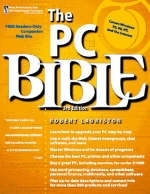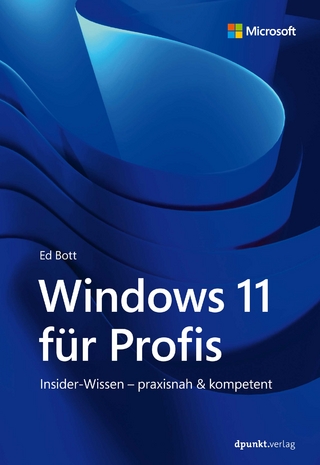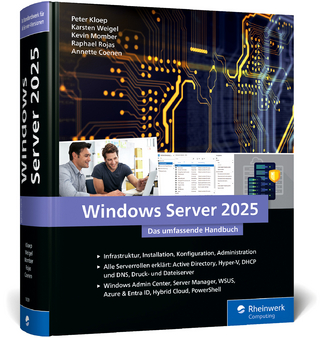
The PC Bible
Addison Wesley (Verlag)
978-0-201-35382-2 (ISBN)
- Titel ist leider vergriffen;
keine Neuauflage - Artikel merken
Personal computers are ever-evolving, with faster processors and new multimedia equipment, not to mention the hundreds of new software programs and applications being developed. Even longtime PC users need a complete and up-to-date reference for a quick spin through an unfamiliar program or a clear explanation of an obscure PC quirk.
The PC Bible, Third Edition covers the universe of PC hardware and software. With 75,000 copies sold worldwide, it's a proven readers' favorite.The third edition is fully updated and reworked, with complete coverage of Windows 98 and expanded Internet and networking sections.This blockbuster volume is both an indispensable guide for beginners and a necessary resource for anyone who wants to know what to buy, how to find it, and how to use it.
1. For Beginners Only.
Unpacking and Getting Settled. The ABCs of Hardware. Making the Right Connections. Flicking the Power Switch. What's It Mumbling to Itself? What You See After Your PC Boots Up. The Keyboard and the Mouse A Tour of the Keyboard. Using a Mouse. CD-ROMs and Floppies. For both floppies and CD-ROMs. For floppies. For CD-ROMs. Application Basics 18. Opening, Storing, and Abandoning Files. Bye for Now (Shutting Down). Resources for PC Beginners.
2. How to Buy a PC.
The Basic PC. CPU. L2 Cache. Memory. Hard Disk. CD-ROM / DVD-ROM Drive. Video Card. Modem. Sound and speakers. Slots and Bays. Keyboard and Mouse. Windows 98. Warranty, Service, and Tech Support. Other Stuff You Might (or Might Not) Want to Buy with a New PC. Applications. Monitor. Printer. Scanner. Zip Drive. Tape Backup Drive. Network Adapter. SCSI Adapter. UPS (Uninterruptible Power Supply). What Brand to Buy. Dell. Compaq. Hewlett Packard. IBM. Gateway 2000 and Micron. Packard Bell NEC. Sony (and Toshiba?). Generic Clones: Parts in a Box. Getting the Best Deal. PC-Buying Resources
3. Notebook PCs.
Six Basic Notebook Types. Screen Considerations. Keyboards and Pointing Devices. Pointing Devices. Notebook Modem Choices. Other Notebook Components. CPU. Memory. Drives and Bays. Ports and Slots. Speakers. About Batteries and Power Management. Power Management. Convenience Features. The AC Power Supply. Off-the-Road Connections. Durability and Security. Service. Exchanging Files with Your Desktop PC. Ten Tips for Mobile Computing Notebook Resources.
4. Disks, Hard and Otherwise.
Hard Disks, Floppies, CD-ROM Drives. CD-ROM Plus: CD-Rs, CD-RWs, and DVD-ROMs. CD-R Drives. CD-RW Drives. DVD-ROM Drives. Recordable DVDs: Too Many Cooks Spoil the Alphabet Soup.Zips and Other Removable Media. Disk Drive Resources.
5. Monitors, Etc.
Monitor Buyers Guide. Monitor Size. Monitor Image Quality. Controls and Adjustments. Monitor Buying Tips. Health and the Environment. Flat-Panel Displays. Video Cards. Monitor and Video Card Resources.
6. Printers.
Laser Printers. Print Quality. Print Speed. Paper Handling. Built-in Fonts. Compatibility. Controls. Memory. Operating Costs. Inkjet Printers.. Print Quality. Paper Handling. Compatibility. Operating Costs. Dot Matrix Printers. Multifunction Printers. Serious Color Printers. Printing Advice. Speed Printing. The Stuff You Print On. Printer Sharing and Switching. Printer Resources. Freeware/shareware. Recommended Printer Manufacturers.
7. Input Devices.
Keyboards. Ergonomic Keyboards. Keep Those Keys Clean. Pointing Devices. A Plague of Mice. Getting on the Trackball. Touchpads: Let Your Fingers Do the Mousing. Drawing Tablets. Are Pens Mightier Than the Keyboard?. Scanners and Scanning. How to Pick a Scanner. Halftones and Scanning Resolution. OCR: From Hardcopy to Editable Text. Top 10 Scanning Tips. Digital Cameras Input Device Resources. Keyboards. Voice Recognition. Pointing Devices. Drawing Tablets. Scanners. Digital Cameras.
8. Upgrade It Yourself.
What Every Upgrader Should Know. Tools of the Trade. Disassembly without Destruction. Installing Expansion Cards. Matching Cards and Slots. Plug and Play Troubleshooting Conflicts.. The Four Types of Hardware Configuration Conflicts. Resolving Conflicts. Upgrading Your Video Card. Adding Video Memory. Installing a Modem. Resolving Serial Port Conflicts. Adding Memory. Buying the Right Kind of Memory. Installing Memory Modules.Installing EIDE Drives. Finding a Drive Bay for the Upgrade. EIDE Configuration Issues. Installing the Drive. Setting Up a New Hard Disk. Tool-Free Upgrades: USB and Parallel-Port Devices. Adding USB Ports to Your PC. CPU Upgrades. CPU Chip Swaps. Motherboard Transplants Upgrade Resources. Video Cards. Memory. EIDE Drives. USB Ports and Devices. CPU Upgrades. Motherboard Transplants.
9. Protect Your Data.
Back It Up or Lose It All. Backup Basics. Backup Hardware. Backing Up without Hardware. Backup Software. Backup Strategies. The Bare Minimum. Backups by the Book. The Anal-Retentive Backup. Storing and Labeling Backups. Rotating Media. Storage. Backing Up Forever. Backup Labeling. Killer Viruses. Antivirus Software to the Rescue. Detection. Disinfection. Prevention. PC Security: Who Needs It?. Minimum Security PCs. More Stringent Measures. Floppy Drive Locks. Data Encryption Software. Access Control. Removable Storage Devices. Avoid Power Struggles. Power Shopping. Burglar-Proof Your PC Data Protection Resources. Backup Hardware and Software. Online Backup Services. Antivirus. Removable Hard Disk Mounting Kits. Surge Suppressors, Line Conditioners, and UPSs. Antitheft Devices.
10. How To Choose and Buy Software.
Microsoft.. How Did Microsoft Get So Big?. Is Microsoft a Monopoly?. Will You Be Assimilated?. Resistance Is Not Futile. Software Suites.. Microsoft Office. Corel WordPerfect Suite. Lotus SmartSuite. Mini-Suites: AppleWorks and Microsoft Works. Buying Software . Software Return Policies. Official Price vs. Street Price. Finding the Best Price. Academic Discounts. Rebates. Closeouts and Free Upgrades. Buying Software by Mail or on the Web. Shareware. Freeware vs. Public-Domain Software. Piracy. Software Buying Resources.. Microsoft. Software Suites. Price Guides. Academic Discounts.
11. Windows 95, 98, and NT.
Which Windows Is Right for You? The 10-Minute Windows Tour.. The Tour Starts Here. The Windows Cookbook.File Tasks. See what files are in a folder. To move from one folder to another. To copy or move files or folders. To select multiple files or folders. To create a new folder. To delete files or folders. To rename files or folders. To find files or folders. To retrieve accidentally deleted files or folders. Disk Tasks. To format a floppy or other removable disk.. To copy a floppy or other removable disk. Application Tasks. To install an application. To start an application. To open a file. To save a file. To print a file. To switch between programs. How to Install Windows. Installing on a Brand-New Drive. Upgraders Start Here. A Few Notes on Installing Windows NT. How to Organize Your Hard Disk. Segregate Data and Applications. Organize by Project. Temporary Holding Areas. Using Disk Compression. Safety Check.. Create an Emergency Boot Disk. Regular Maintenance Checklist. All That Windows Stuff.. What's All That Stuff on the Desktop?. What's All That Stuff on the Start Menu?. What's All That Stuff in the Control Panel?. More Stuff Worth Knowing About. Optimizing Windows.. Optimize the Display. Customize the Taskbar. Customize the Desktop. Customize the Start Menu. Using Shortcuts. Running DOS Applications under Windows. The Windows 95/98 Boot Menu. Mouse Tricks and Keyboard Shortcuts.
12. Windows Add-Ons.
Essential Add-Ons. WinZip: Compress and Consolidate Files, Span Disks. Acrobat Reader: View and Print Online Documents. Options and Enhancements. TweakUI: Change Windows' Look. QuickRes: Fast Access to Display Options. Other Power Toys. Norton Utilities: Improved Disk Tools, NT Defragger. Quick View Plus. Alternative File Managers. For Nerds Only. Partition Magic: Resize and Convert Disk Partitions. System Commander: Manage Multiple Operating Systems. CleanSweep Deluxe: The Ultra Uninstaller. . Font Formats. How to Install Fonts. Where to Find Fonts. Using Fonts Effectively. Font Gallery. Windows Add-On Resources. Fonts.
13. Word Processing & Desktop Publishing.
Anatomy of a Word Processor. Building Documents that Get Results. Think It Through. Templates and Document Design. Typing It In. When Word Gets in Your Way. Editing to Perfection. Formatting. Word Formatting Basics. Indents and Margins. Bullets and Numbering. Line and Paragraph Spacing. Using Styles. Columns. Page Numbering. Headers and Footers. Dual-Sided Pages. Including Other Elements. Tables. Graphics. Embedded Objects. WordArt. Equations. Finding Your Goofs. Printing. Printing Envelopes. Printing Labels. Customizing Word. Choosing a Word Processor. Desktop Publishing. Word Processing Resources.
14. Spreadsheets.
Spreadsheet Basics. A Walking Tour of the Spreadsheet Shop Floor. Anatomy of a Workbook. Ranges and Range Names. Cell Values: Formulas Versus Data. Copying and Moving. Cell Formatting. Graphs. Printing. Macros. Databases. Step This Way for Lesson One. Building a Template Worksheet. Step 1. Enter the Labels. Step 2. Build and Check the Formulas. Step 3: Format Your Template. Step 4: Finish Up. Building a Database Worksheet. Step 1: Is Your Spreadsheet Really a Database?. Step 2: Set Up the Database Table. Step 3: Build the List Report. Step 4: Create the Subtotal Report. Step 5: Create the Pivot Table Report. Step 6: Make a Chart from a Pivot Table. More Excel Features to Explore. Right-Click Tricks. Formatting Tricks. The Drawing Layer. Advanced Analysis. Arrays. Intelligent Data Import. External Data Access. Macros. Spreadsheet Resources.
15. Personal Finance and Tax Software.
Personal Finance Basics. More Than You'll Ever Need. Setting Up Shop. Quicken 99. Let's Get Started. Banking and Budgeting. Once Is Not Nearly Enough: Automating Quicken. Investing with Quicken. Microsoft Money 99. Easy Setup. Flexible Bill Paying. Investing with Money. Quicken 99 vs. Money 99: A Quick Recap.Tax Software. The Interview Interface. Reducing Your Tax Bill. Filing. TurboTax vs. TaxCut. Personal Finance and Tax Resources.
16. Databases.
What Is a Database?. Off-the-Shelf Data Managers. Personal Finance Programs. Contact Managers and PIMs. Accounting Software. Industry-Specific Software. Create Your Own Database. Database Do-It-Yourself Basics. The Relational Database Debate. Using Your Spreadsheet. Using Your Word Processor. Using FileMaker Pro. Using Microsoft Access. Know Your Limits: When To Call in the Pros. Database Resources.
17. Painting, Drawing, and Other Graphics Software.
Paint Basics. Paint Programs. Adobe Photoshop. Corel Photo-Paint. JASC Paint Shop Pro. Metacreations Painter. Micrografx Picture Publisher. Plug-Ins. Drawing Basics. Drawing Programs. Adobe Illustrator. CorelDraw. Corel Xara. Macromedia FreeHand. Other Graphics Software. Web Graphics. 3-D Rendering. CAD. Diagramming. Screen Capture. Clip Media. An Introduction to Color. RGB vs. CMYK. Spot Color. Color Management. Service Bureaus. Field Guide to Graphics File Formats. Bitmap File Formats. Draw File Formats. Graphics Resources. Paint Programs. Drawing Programs. Web Graphics. Clip Media.
18. Sound and Video Editing.
Sound Basics. Audio Hardware Options. Audio Specs. Audio vs. MIDI. Editing Audio. Plug-Ins. Multi-Track Recording. CD Burning and Web Audio. Other Ways to Make Noise. Video Basics. Video Capture from Standard Camcorders. Digital Camcorders. Editing Video. Animation and Special Effects. Audio and Video Editing Resources. Audio. Video.
19. Getting on the Internet.
Which Kind of Connection?. Modem. ISDN DSL. Satellite. Cable Modem. Get What You Pay For: Choosing the Right ISP. Making the Connection. Using the Internet Setup Wizard. Using the Internet Connection Wizard. Using NT's Dial-Up Networking Phonebook. Internet Access Resources.
20. E-Mail.
E-Mail for Beginners. Anatomy of an E-Mail Program. Which E-Mail Software for You?. Configuring Your E-Mail Program. E-Mail Error Messages. Should It Be POP3 or IMAP?. Other Things You May Wish to Set. Sending Files or Attachments via E-Mail. How to Send a File Attachment. How to Read or View a File Attachment You've Received. More E-Mail File Attachment Tips. Top Ten E-Mail Tips. How to Use E-Mail Filters. E-Mailing the Military. How Private Is E-Mail?. Adding Security Certificates to Messages. Encryption for the Masses. E-Mail: Battling the Spam Monster. Protecting Yourself Against Spam. Complaining about Spam. Spam Forensics 101: Reading E-Mail Headers?. Want to Remain Completely Anonymous in E-Mail? Try a Remailer. America Online E-mail Tips. Outlook Express E-Mail Tips. Netscape Messenger E-Mail Tips. Eudora Light Tips. E-mail Resources.
21. The Web and Browsers.
A Brief History of the Web. Browser Basics. Navigation and Interface Design. Toggling Graphics On and Off. Bookmarks. History. Cache and Offline Access. Security. Performance. Multimedia. Java and ActiveX. Plug-Ins. Which Browser?. Netscape Navigator and Communicator. Microsoft Internet Explorer. Opera. Search Engines. Yahoo!. AltaVista. Other Search Engines. Search Tips. Downloading Software. What Else Is Out There? Creating Your Own Website. Web Resources. Browsers. Search Engines.Downloading Software. What Else Is Out There?
22. Online Discussions: Newsgroups, Etc.
Newsgroups. Newsgroup Types and Organization. Reading and Posting to Newsgroups. Posting Tips. Finding Newsgroups and Messages. Mailing Lists. Web Message Boards. Resources for Online Discussions. Newsgroups. Mailing Lists. Web Message Boards.
23. Internet Live: Chat, Etc.
Getting into Chat. Three Kinds of Chat Getting the Software You Need. Connecting to IRC Networks. How to Chat. Chat in Perspective. Finding Channels and Chat Events. Real-Time Games. Internet Phone Calls and Videoconferencing. Internet Real-Time Resources.
24. Use Your PC as a Phone or Fax.
Using Your PC as a Fax Machine. Microsoft Fax. WinFax Pro. Using Your PC as a Speakerphone or Voicemail System. TalkWorks Pro. PC Phone and Fax Resources.
25. Networks: Connecting PCs.
Why and When You Want a Network. Network Basics. Network Design. Ethernet Hardware. Network Protocols. Installing a Small Network. Install the Hardware. Troubleshoot Common Problems. Test the Network. Using Your Network. Sharing a Printer. Sharing a Folder or Drive. Exchanging E-mail. Sharing a Fax Modem. Setting Up a Remote Access Server. Accessing Your Network from the Internet. When Do You Need a Dedicated Server?. Server Operating Systems. PC to Mac and Back. Sharing Printers. Sharing and Converting Files. Without a Net. Network Resources. Network Support.
26. Health and Safety.
Health and Safety Guide. Monitors: Preventing Eyestrain and Fatigue. Staying Out of the Rays. Eye Care. Input Devices: Protecting Hands and Arms. Workstations: Saving Your Back and Neck. I Think, Therefore I Sit. Other Hazards. Health and Safety Resources
27. HELP! Where to Turn When Things Go Wrong.
Do-It-Yourself Support. Coping with Tech Support. Troubleshooting and Tech Support Resources
= Glossary.
Appendix A. DOS Survival Guide.
DOS Prompt Basics. Getting to Windows from DOS. Displaying the Contents of the Current Directory. Changing Directories. Adding Paths or File Names to Commands. DOS Shortcuts.
DOS Cookbook.
File Tasks. To See What Files Are in a Directory. To Move From One Directory to Another. To Copy or Move Files or Directories. To Select Multiple Files. To Create a Directory. To Delete Files or Directories. To Rename Files or Directories. To Recover Accidentally Deleted Files or Directories. Disk Tasks. To Format a Floppy. To Copy a Floppy Disk. Application Tasks. To Install an Application. To Start an Application. To Open a File. To Print a File. DOS Command Guide. Tuning AUTOEXEC.BAT and CONFIG.SYS. CONFIG.SYS. AUTOEXEC.BAT.
Appendix B. Windows 3.1 Survival Guide.
Windows 3.1 Basics. Windows 3.1's Desktop. Program Manager and File Manager. Windows 3.1 Mouse and Keyboard Shortcuts.
Windows 3.1 Cookbook.
File Tasks. To See What Files Are in a Directory. To Move From One Directory to Another. To Copy or Move Files or Directories. To Select Multiple Files. To Create a Directory. To Delete Files or Directories. To Rename Files or Directories. To Find a File. To Recover Accidentally Deleted Files or Directories. Disk Tasks. To Format a Floppy. To Copy a Floppy Disk. Application Tasks. To Install an Application. To Start an Application. To Open a File. To Print a File. To Switch Between Applications
| Erscheint lt. Verlag | 13.1.1999 |
|---|---|
| Überarbeitung | Robert Lauriston |
| Verlagsort | Harlow |
| Sprache | englisch |
| Gewicht | 1592 g |
| Themenwelt | Informatik ► Betriebssysteme / Server ► Windows |
| Mathematik / Informatik ► Informatik ► Netzwerke | |
| Mathematik / Informatik ► Informatik ► Office Programme | |
| Informatik ► Weitere Themen ► Hardware | |
| ISBN-10 | 0-201-35382-2 / 0201353822 |
| ISBN-13 | 978-0-201-35382-2 / 9780201353822 |
| Zustand | Neuware |
| Informationen gemäß Produktsicherheitsverordnung (GPSR) | |
| Haben Sie eine Frage zum Produkt? |
aus dem Bereich


